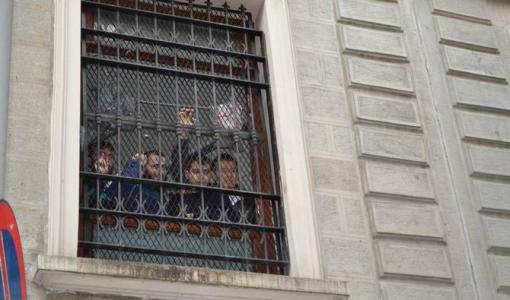ECHR: Kumkapı Removal Centre Is “Inhumane”

The European Court of Human Rights delivered its verdict on the case of Zalim Yarashonen, a Russian citizen who had been kept in Kumkapı Removal Centre in Istanbul for six months.
The court found Turkey guilty of violating the European Convention of Human Rights Article related to “ban of torture and ill-treatment”, “right to freedom and security” and “right to efficient application”.
Diagnosed with tuberculosis after leaving
Zalim Yarashonen travelled to Turkey in order to investigate the killing of his father and brother by Russian security officials. On October 25, 2010, he was detained for entering the country “illegally”. His passport was seized by police authorities.
On 1 November 2010, the applicant was transferred to the Kumkapı Removal Centre. However, he could only met with his lawyer seven days later.
On 18 April 2011, Yarashonen applied for asylum. He said that he had caught flu three to four months before, but had not sought any treatment and was still suffering from it.
His lawyer sent a letter to the General Security Directorate of the Ministry of the Interior by standard post complaining that he was being detained unlawfully and requesting his release. In the letter he also brought the applicant’s health issues to the authorities’ attention and requested medical assistance.
On 29 April 2011, he was released from detention and granted an asylum-seeker certificate. Later on, he went to the Süreyyapaşa Thoracic and Cardiovascular Surgery Training and Research Hospital in Istanbul. Further medical tests conducted at the hospital revealed that the applicant was suffering from tuberculosis pleurisy. He received in-patient treatment at the hospital until 15 June 2011.
40 square meters, 15 beds, 45 patients
Yarashonen claimed that the Kumkapı Removal Centre was severely overcrowded at the time of his detention, which lasted five months and twenty-seven days. He had to share a dormitory room of approximately 40 sq. m with twenty-four to forty-five other people, who were provided with only fifteen bunk-beds. The centre had an overall capacity of 560 people at the relevant time, but accommodated around 600 people.
“The building was infested with insects and there were frequent outbreaks of contagious diseases; he had thus contracted a serious bacterial infection. The quality and quantity of the food provided was also fairly poor. Moreover, there was no provision for outdoor exercise at the Kumkapı Removal Centre, which meant that he had been unable to go outside throughout his detention,” he wrote in his lawsuit.
Yarashonen complained that he had been unlawfully detained without the opportunity to challenge the lawfulness of his detention and that he had not been duly informed of the reasons for his deprivation of liberty. He further maintained that he had had no right to compensation under domestic law in respect of these complaints.
On June 24, ECHR announced its verdict.
The court held that there had been a violation of Article 3 of the Convention on account of the material conditions of the applicant’s detention at the Kumkapı Removal Centre; and a violation of Article 13 of the Convention in conjunction with Article 3 on account of the absence of effective remedies to complain about the material conditions of detention at the Kumkapı Removal Centre.
The court also ordered to Turkey to pay Yarashonen 10,000 euros in respect of non-pecuniary damage and 3,997 euros for costs and expenses.
“Kumkapı snapshot” from ECHR
Releasing a statement after the verdict, MAZLUMDER official Abdulhalim Yılmaz said that only two individuals died of tuberculosis in the center in February.
“Conditions are terrible… In a way, ECHR took a snapshot of the detention and living conditions in this center. The most important aspect of the verdict is the conviction that the condition of Kumkapı Center violated Article 3 of the Convention regarding ill-treatment and torture.” (AS/BM)
* Click here to read the article in Turkish.
bianet submits shadow report to UN Human Rights Committee

Imprisoned lawyer exposes use of disciplinary investigations to pressure political prisoners

Tap water ‘smells of bleach’ in Muğla prison

Censorship on a letter from prison describing hunger

Prisoner on hunger strike: 'I am alone without sunlight'







